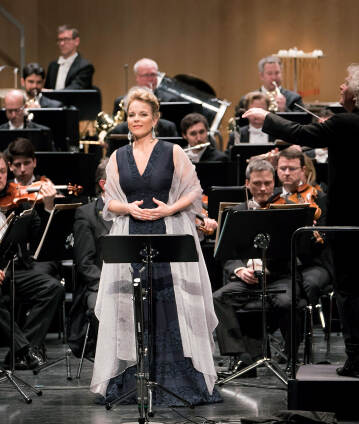Simon Rattle and Elīna Garanča at the Baden-Baden Easter Festival

In this Baden-Baden Easter Festival concert, Simon Rattle presents a sonorous snapshot of the European music scene in the early 20th century. It includes Richard Strauss’s self-confidently impressive Don Juan, sumptuous songs by Alban Berg, Ravel’s overwhelmingly sensual song cycle Shéhérazade and finally Stravinsky’s both groundbreaking and nostalgic Petrushka. The star guest is the Latvian mezzo-soprano Elīna Garanča.
The turn of the century was an incredibly exciting era, in which the developments of the dawning modern age cast their shadows ahead, but at the same time the sensuous sound of the late Romantic period still resonated. A graphic example of these fluid changes in musical eras are the Seven Early Songs by Alban Berg. Even contemporary audiences will have been astonished when, in 1928, Alban Berg published his cycle, characterised by lush instrumentation and voluptuous harmonies. After all, the premiere of his groundbreaking opera Wozzeck had already taken place. These songs were in fact youthful works from the early twentieth century which Berg later revised and orchestrated.
Almost simultaneously with the original version of these works, Maurice Ravel’s three-part cycle Shéhérazade was premiered in 1903. With overwhelming sensuousness, Ravel creates an erotically ecstatic phantasmagoria of the Orient, whose protagonist is the famous storyteller from the famous One Thousand and One Nights collection of tales.
The French music world’s fascination with the Orient at that time had essentially a Russian background. Ravel and his friends loved the symphonic suite Scheherazade by Nikolai Rimsky-Korsakov, whose students included Igor Stravinsky. Stravinsky’s early fame was the result of three ballet scores created for the legendary Ballets Russes in the 1910s. The middle of these three works is Petrushka: the both enchanting and sinister story of the eponymous hero and his unrequited love for a ballerina. The composer magically captures the colour of a nineteenth-century Russian fair, contrasting avant-garde stylistic devices with deliberately archaic folk music.
Like the other works in this programme, Richard Strauss’s Don Juan is characterised by a combination of youthful temperament and astonishing compositional self-assurance. The symphonic fantasy of the notorious philanderer marks the beginning of Strauss’s series of programmatic orchestral works which have always been part of the core repertoire of the Berliner Philharmoniker.
© 2018 EuroArts Music International
Category
Artists
Our recommendations
- The Berliner Philharmoniker, Simon Rattle and Karita Mattila at the “Proms”
- Simon Rattle conducts a Beethoven evening in Taipei
- Beethoven and Mozart with Simon Rattle and Mitsuko Uchida at the Easter Festival
- Simon Rattle conducts Wagner’s “Götterdämmerung” at the Festival d’Aix-en-Provence
- Simon Rattle with Bruckner’s Seventh in Taipei
- 2005 Europakonzert from Budapest with Simon Rattle and Leonidas Kavakos